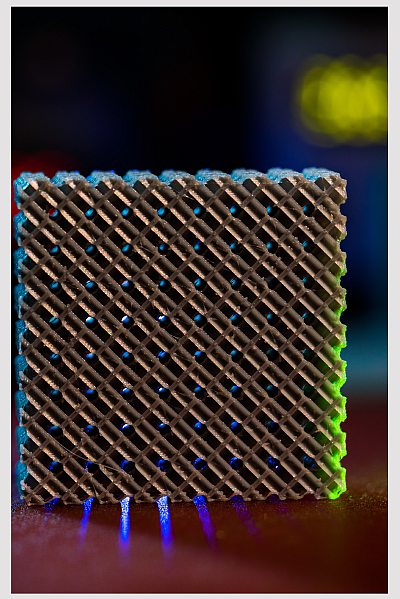Building on Georgia Tech’s Leadership in Materials Innovation Infrastructure, MD3 will facilitate exploration of open source and commercial data science methods within the materials innovation ecosystem based on 3 key pillars.
Data Analytics
- Filtering
- Data fusion
- Uncertainty analyses
- Statistical analyses
- Dimensionality reduction
- Pattern recognition
- Regression analysis
- Machine learning
- Statistical learning
Data Management
- Capture
- Storage
- Aggregation
- Sharing Protocols
- Knowledge databases
E-Collaboration
- Utilize open source and open access data/code repositories
- Facilitate cross-disciplinary team discussions and annotations of intermediate results
- Manage workflows and identify best practices
- Decision support for future investments with high ROI

MD3 Goals
R&D in data science and informatics via:
- Integrated projects making use of existing and emergent state-of-the-art best practices and methods, tailored to your needs
- Methods to accelerate process development with data-driven decision support
- Strategies to identify and organize important materials data and accumulated knowledge, including important electronic metadata in materials development
- Accelerated qualification procedures for vendors and the supply chain
Preparing the 21st century workforce for accelerated materials design, development and deployment through:
- Low entry cost opportunity to familiarize and train your current employees in MD3
- Increased exposure of your organization to modern data science tools and e-collaboration platforms for materials discovery and development
- Networking with domain experts at the nexus of materials science, manufacturing, data science, and high throughput methods, including commercial data services vendors; closer linkage of OEMs and their supply chains
MD3 Projects
Accelerated Materials Discovery

Projects related to preliminary data and design of materials accelerated via data informatics.
Data-Driven Discovery of Polymeric Material for 3D Printing
Architects: H. Jerry Qi, GWW School of Mechanical Engineering, School of Computational Science and Engineering; Rampi Ramprasad, School of Material Science and Engineering
High-throughput Computational Catalyst Screening
Architects: Andrew J. Medford, School of Chemical & Biomolecular Engineering
Materials Informatics & Machine Learning
Architects: Rampi Ramprasad, School of Material Science and Engineering
Accelerated Materials Development & Deployment
Projects related to real-world deployment of specialized materials accelerated via data informatics.
 Establishing Processing-Structure-Properties (PSP) Linkages Using Tensor Analysis
Establishing Processing-Structure-Properties (PSP) Linkages Using Tensor Analysis
Architects: Richard W. Neu, GWW School of Mechanical Engineering, School of Materials Science and Engineering; Kamran Paynabar, School of Industrial and Systems Engineering
Expert-Guided MD3 Systems
Architects: J. C. Lu, Stewart School of Industrial and Systems Engineering; Elsa Reichmanis, School of Chemical & Biomolecular Engineering; Martha Grover, School of Chemical & Biomolecular Engineering
Sequential Experimental Design
Architects:J. C. Lu, Stewart School of Industrial and Systems Engineering; Martha Grover, School of Chemical & Biomolecular Engineering; Dennis Hess, School of Chemical & Biomolecular Engineering
Multi-Physics Multi-Scale Model to Predict Corrosion Behavior of Dissimilar Material Joints
Architects: Preet M. Singh, School of Materials Science and Engineering
Autonomous Explorations in Materials Innovations
Architects: Surya R. Kalidindi, GWW School of Mechanical Engineering, School of Computational Science and Engineering; Ali Khosravani, GWW School of Mechanical Engineering
ELA: Experiments and Laboratory Automation Platform
Architects: Surya R. Kalidindi, GWW School of Mechanical Engineering, School of Computational Science and Engineering; Ali Khosravani, GWW School of Mechanical Engineering
High-Throughput Rapid Screening of Materials Design Space
Projects related to testing life-cycle resiliency homogeneous production of specialized materials accelerated via data informatics.
 Adaptive Catalyst Testing and Optimization
Adaptive Catalyst Testing and Optimization
Architects: Andrew J. Medford, School of Chemical & Biomolecular Engineering
Autonomous Functionalization of Natural Fibers for Advanced Materials
Architects: Carson Meredith, School of Chemical & Biomolecular Engineering
Coupled Machine Learning and High Throughput Development of Polymer Blends
Architects: Carson Meredith, School of Chemical & Biomolecular Engineering; Elsa Reichmanis, School of Chemical & Biomolecular Engineering; Martha Grover, School of Chemical & Biomolecular Engineering
High Throughput Electrochemical Tests for General and Localized Corrosion
Architects: Preet M. Singh, School of Materials Science and Engineering
High-Throughput Experimental Assays to Assess Creep Properties
Architects: Richard W. Neu, GWW School of Mechanical Engineering, School of Materials Science and Engineering; Surya R. Kalidindi, GWW School of Mechanical Engineering, School of Computational Science and Engineering
High-Throughput Experimental Assays for High Cycle Fatigue
Architects: Richard W. Neu, GWW School of Mechanical Engineering, School of Materials Science and Engineering
High-Throughput Melt-Based Polymer Screening
Architects: Carson Meredith, School of Chemical & Biomolecular Engineering
High Throughput Experimental Assays for Structural Materials
Architects: Surya R. Kalidindi, GWW School of Mechanical Engineering, School of Computational Science and Engineering; Rick Neu, GWW School of Mechanical Engineering


